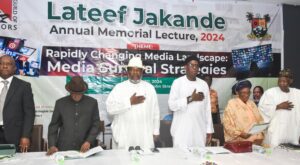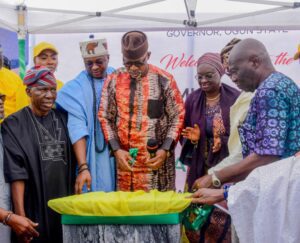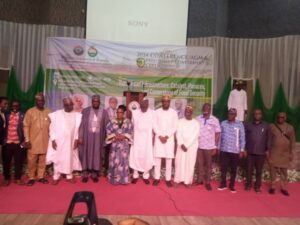


Jakande memorial lecture: Editors identify challenges, chart way forward for survival of Print media
…As Obaigbena harps on increased youth inclusion
Editors under the aegis of the Nigerian Guild of Editors (NGE) convened recently to identify challenges facing the survival of Print media in the country and chart the way forward.
The Editors spoke at the Lateef Jakande Annual Memorial Lecture, 2024, with the theme: ‘Rapidly Changing Media Landscape: Media Survival Strategies,’ organised by the NGE in Lagos.
In his remarks, the lead speaker, Obaigbena said, “Journalism in Nigeria started 165 years ago today. Iwe Irohin started in 1859. In those 165 years, a lot has changed. Today, we are all seated here. What is the average age of the editors who are here? Most of us here are over 40. Where are the young people who are 30, 40, 50 percent of the population who are reading, who are engaging, who are on social media? Why are they not among you? How old was Uncle Sam when he was in Daily Times? How old was Peter Enahoro? How old was Ike Nwachukwu? They were all young people in their 20s and 30s.
“And today, we say we are in survival mode. That survivor must come from the audience. And your audience in Nigeria are young people. Are you engaged with them? Are you working with them? Are they part of your news today? We are in a new world. The United States of America has an election in about 100 days. Donald Trump was engaging with the crypto community and telling the world that he’s going to keep part of US reserves in crypto. Then you have a woman who may also make history with her own directions.
“So, that is the world that we are going into, led by one of those two people. How prepared are we if crypto is a new currency? For instance, how will we engage? How will our media present our country? The world is being driven by technology and technology is shaping the media. I heard the lamentation of Uncle Sam that he could not buy his paper again in Ife, Osun State. Yes, but the content he could not buy was already in Ife the night before. People had consumed it.
“People had read it. So, that information is still there. We are only a means of distribution of that information. As journalists, we write stories and engage with audiences. The newspaper is just a form of distribution of that news. Your phone is for distribution. Your computer is for distribution. So, let us not confuse the idea and the means of distribution. That means of distribution is changing, but good journalism will not change. However, what is good journalism?
“Old-fashioned truth, getting your facts right, telling the story as it is, engaging with your audiences and building a future. However, that does not mean that journalism is under crisis. We have what they call artificial intelligence.
“So the world we are going to, we are confronted and challenged by artificial intelligence. What is AI? AI is a conference of software, hardware and proper algorithms which have an impact across the board. But more importantly, in the media. They can take your face. They can take your voice. They can take your identity. And create anything. So the threat we face is in AI, but AI is a machine. We have to train AI. We have to treat AI.
“We have to challenge AI. Then AI will respond. Are we ready for a world that is being changed by artificial intelligence? Where young people of seven and eight take the computer, take their phones and can do a lot with it. Therefore, my friends and colleagues, that is where we face challenges, but we can also use it for good.
“We have to enable the IP, the work of your brain, as an asset class. That asset class, you can, has to be bankable. So you can raise money against it, and you can create value. And the first thing that I challenge the Minister of Information and the past minister to do is to ensure that we pass a law that those who use our work online – Google, Facebook, Instagram – must pay for it.
“If we get payment for the work we do every day as journalists, we’ll be in a far better place. That’s the first survival instinct that we must build either as a group, led by the Guild of Editors, working with the government to ensure that our intellectual property, what we do, is shared every day on social media, once that order is paid for. That is the first step. The next step is to be prepared for AI. It’s to promote education and to ensure good governance,” Obaigbena remarked.
On his part, Lai Mohammed, noted that Jakande, the founding President of the guild, fought for the press freedom that journalists are enjoying today.
“Jakande practised journalism at the most difficult time, he was fearless and courageous. I’m glad to honour an Icon,” Mohammed said.
The NGE President, Mr Eze Anaba, in his opening remarks said that Jakande with his colleagues, associates and students worked assiduously and created the platform for editors in 1961 for the purpose of addressing issues bedevilling the media.
“The man in whose honour this lecture was instituted lived a principle and impactful life. Alhaji Jakande devoted his entire professional and political career to advancing liberty and social justice.
“He also exemplified the value of honesty, integrity, courage and fairness. He told the story of the powerless and held the powerful into account and he demonstrated commitment to journalists freedom and long term survival,” Anaba said.
According to Anaba, “besides the circumstances in which we report, produce and distribute the news, the cost of production has hit the roof and sales have fallen daily.
“As media managers we have to think of innovative and sustainable issues. We should also find a way of addressing the impact of new technology in every part of our law as journalists and media practitioners.
“We have to work harder and do more to adjust and adapt to survive and bring our work to the audiences.”
Deji, the first son of Jakande appreciated NGE for the honour done to his late father and promised that they (children) would live up to expectation.



